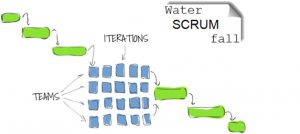WATERSCRUMFALL: THE NEW HYPE IN SOFTWARE DEVELOPMENT?
February 24, 2014
 Agile development and testing have become more and more a common practice in IT teams for the last years, and the momentum is still continuing. Obviously, the volume of projects in waterfall mode is decreasing gradually. We all know that this is (often) not reflecting the reality. Organizations are very often applying a kind of hybrid development method, called “waterscrumfall”. It is not always clear if this is intentional or just a matter of not being able to do better. But it is a given: waterscrumfall is much more present than a more pure form of agile (read: scrum) or waterfall way of working.more–>
Agile development and testing have become more and more a common practice in IT teams for the last years, and the momentum is still continuing. Obviously, the volume of projects in waterfall mode is decreasing gradually. We all know that this is (often) not reflecting the reality. Organizations are very often applying a kind of hybrid development method, called “waterscrumfall”. It is not always clear if this is intentional or just a matter of not being able to do better. But it is a given: waterscrumfall is much more present than a more pure form of agile (read: scrum) or waterfall way of working.more–>
This is not a judgment, it is a fact of life. This mixed method leads of course to a few questions.
First, if you apply a hybrid method, do you profit then from the advantages of the two methods, or are you only suffering from the disadvantages? Or both? Well, this depends of course on how this hybrid form looks like. As it is something between two schools, there is not one way of organizing waterscrumfall, but for each organization at least one way of running their projects. The context driven concept is in this respect not far away…
Secondly, what does an organization want to achieve with this hybrid form? Most of the times, companies decide to transition from a traditional way of working to an agile (but which method in fact?) modus. Agile is often the answer management sees to cope with a variety of problems they cannot control. Along this journey, the organization stagnates somewhere in the middle between both methods. So is this hybrid method then really addressing the current problems in IT and business?
Talking about the ambivalent character of waterscrumfall, are agile and waterfall as such also not hybrid or at least contextual? Nobody has seen an agile or waterfall method applied in the same way, so are we then not saying that all methods could be a bit of everything? Or even stating that the scrum method or the waterfall method do not exist at all?
I agree, these questions could seem a bit farfetched, certainly if an organization is happy with their waterscrumfall way of working. Indeed, if it works for the organization, it works. And then why bother wondering if it is scrum, agile, waterfall, iterative or waterscrumfall? To have a standard way of working? Yes, that’s probably a valid argument. But the main question remains relevant: the method chosen is not the purpose itself, but just a means to achieve something else (higher project success rate, more user involvement, happier business parties,…). Asking this question triggers the real discussion if this waterscrumfall is indeed the silver bullet. Rather than focusing on the hybrid method itself, this is not the discussion you want to have.

 English | EN
English | EN 